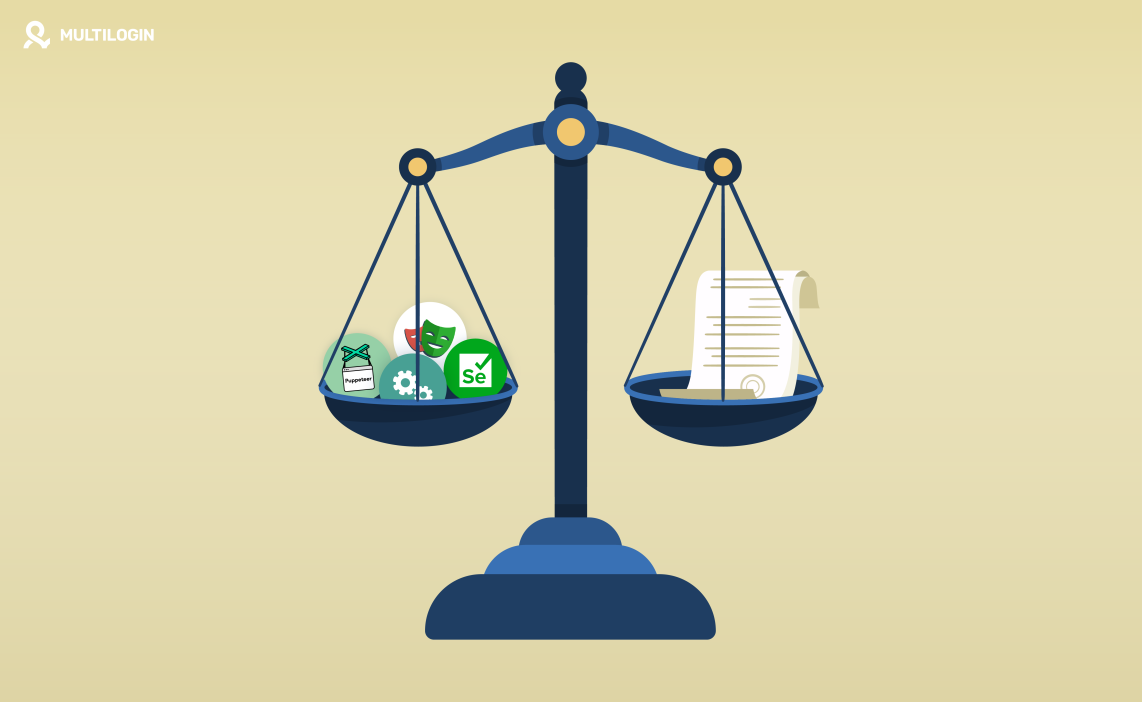Web scraping is a powerful tool that can provide invaluable data for businesses, researchers, and developers alike. However, it is also a topic surrounded by legal ambiguity. Understanding the legality of web scraping in different countries is essential before engaging in any large-scale scraping activities.
In this blog, we’ll break down the legality of web scraping in various regions, including the US, Europe, India, Canada, Germany, Singapore, and the UK, as well as its use for commercial purposes.
What is Web Scraping?
Web scraping refers to the process of extracting data from websites using automated tools or scripts. This data can be anything from product information, customer reviews, or social media content, and it is used for various purposes, including market research, price monitoring, and data analysis.
Is Web Scraping Legal?
The Short Answer
The legality of web scraping depends on a variety of factors, including where you are, what data you are scraping, and how you are using that data. In many cases, scraping public information isn’t explicitly illegal, but scraping private or restricted data can lead to legal issues.
Is Web Scraping Legal in the US?
Web scraping in the US occupies a legal gray area. While scraping public data from websites is generally permitted, scraping data from sites with specific terms of service prohibiting scraping (such as LinkedIn) can result in lawsuits.
The most notable case in the US involved LinkedIn vs. hiQ Labs. LinkedIn sued hiQ Labs for scraping user data, and after several rounds of litigation, the courts ruled in favor of hiQ Labs, stating that scraping public data is not a violation of the Computer Fraud and Abuse Act (CFAA). However, this ruling only applies to public data, and scraping private or restricted data could still violate the CFAA.
Key Points for the US
Public Data: Generally legal to scrape.
Private/Restricted Data: Scraping restricted data can result in lawsuits or criminal charges under the CFAA.
Is Web Scraping Legal in Europe?
In Europe, the legality of web scraping is heavily influenced by GDPR (General Data Protection Regulation). Scraping data that involves personal information—such as names, emails, or any other identifiable information—without proper consent can violate GDPR regulations.
For web scraping to be legal in Europe, explicit consent from the data subject is typically required. Even if the data is publicly available, scraping it without consent may still result in fines or legal actions under GDPR.
Key Points for Europe
Public Data: Can be legal, but must adhere to GDPR regulations.
Personal Data: Requires explicit consent; otherwise, it is a GDPR violation.
Is Web Scraping Legal in India?
India does not have any specific laws that directly address web scraping. However, web scraping may still violate the terms of service of certain websites, and doing so could result in legal action from companies.
While scraping public data in India is generally allowed, scraping private or sensitive information could result in legal consequences under India’s IT Act.
Key Points for India
Public Data: Generally legal, but terms of service violations can lead to lawsuits.
Sensitive Data: Scraping personal or sensitive data could violate India’s IT Act.
Is Web Scraping Legal in Canada?
Canada’s Personal Information Protection and Electronic Documents Act (PIPEDA) governs the collection and use of personal information in Canada. Similar to Europe’s GDPR, scraping personal information without consent may be a violation of PIPEDA.
Scraping public data, as long as it doesn’t involve personal information, is typically allowed, but consent is required when personal data is involved.
Key Points for Canada
Public Data: Permitted if it does not involve personal information.
Personal Data: Requires explicit consent under PIPEDA.
Is Web Scraping Legal in Germany?
Germany’s strict data privacy laws, governed by the Federal Data Protection Act and GDPR, regulate the scraping of personal data. Without explicit consent from the data subject, scraping personal data is illegal in Germany. However, scraping non-personal public data is generally allowed.
Key Points for Germany
Public Data: Legal, as long as it doesn’t involve personal data.
Personal Data: Consent is required for scraping personal data.
Is Web Scraping Legal in Singapore?
Singapore’s Personal Data Protection Act (PDPA) governs data privacy, and scraping personal data without consent is prohibited. However, public data that doesn’t involve personal information can generally be scraped without legal consequences.
Key Points for Singapore
Public Data: Allowed, provided it doesn’t include personal information.
Personal Data: Requires consent under PDPA.
Is Web Scraping Legal in the UK?
In the UK, web scraping is primarily governed by GDPR, which still applies after Brexit. Scraping public data may be legal, but scraping personal information without consent is a clear violation of the law.
Key Points for the UK
Public Data: Legal, as long as GDPR regulations are followed.
Personal Data: Requires explicit consent under GDPR.
Web Scraping for Commercial Use: Is It Legal?
Using web scraping for commercial purposes, such as gathering competitor data or product information, can be a tricky area. While scraping public data for analysis is often legal, scraping data to bypass restrictions or terms of service may result in lawsuits. Commercial scraping also often runs into intellectual property laws and terms of service agreements.
General Guidelines
Public Data: Typically legal for commercial use, but always check the website’s terms of service.
Private Data: Scraping private data for commercial purposes without consent is almost always illegal.
FAQs About the Legality of Web Scraping
Is Web Scraping Legal in the US?
Yes, scraping public data in the US is generally legal. However, scraping private data or violating a website’s terms of service could result in legal action under the CFAA.
Is Web Scraping Legal in Europe?
Scraping data in Europe is legal, but any personal data scraping must adhere to GDPR regulations, meaning consent is required.
Is Web Scraping Legal in India?
While there are no explicit laws in India against scraping public data, violating website terms of service could lead to legal action.
Is Web Scraping Legal for Commercial Use?
Yes, it can be legal to scrape public data for commercial purposes. However, scraping private data or violating a site’s terms of service could result in legal issues.
Can You Get Banned for Scraping?
Yes, websites can detect and ban users or IP addresses engaging in scraping activities, especially when they violate the site’s terms of service.
Is Scraping Legal on LinkedIn?
LinkedIn has taken legal action against companies scraping their data, but public data scraping was deemed legal in a US court ruling (LinkedIn vs. hiQ Labs). However, scraping private data is still a violation of their terms.
Can You Get Banned for Scraping Amazon?
Amazon has strict policies against scraping, and users caught scraping can be banned or face legal action, especially when scraping prices or reviews without permission.
Final Thoughts
The legality of web scraping varies by region, the type of data being scraped, and how that data is used. While scraping public data is often legal, scraping private data or personal information without consent can lead to significant legal issues.
Always make sure you are aware of the specific laws and regulations in your country, and when in doubt, consult with legal professionals to ensure compliance.



